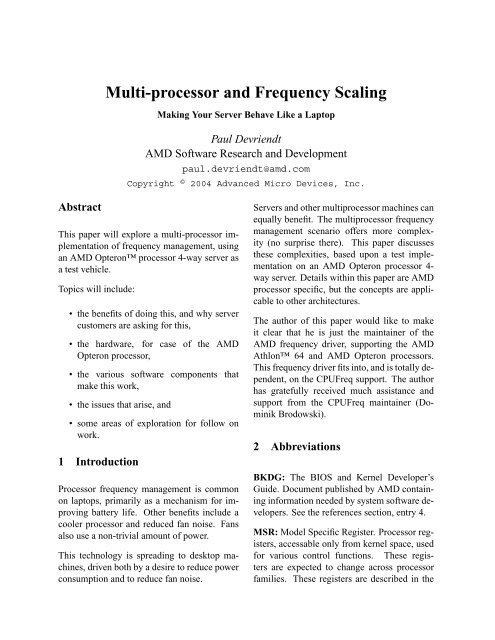Create successful ePaper yourself
Turn your PDF publications into a flip-book with our unique Google optimized e-Paper software.
Multi-processor and Frequency Scaling<br />
Making Your Server Behave Like a Laptop<br />
Paul Devriendt<br />
AMD Software Research and Development<br />
paul.devriendt@amd.com<br />
Copyright © 2004 Advanced Micro Devices, Inc.<br />
Abstract<br />
This paper will explore a multi-processor implementation<br />
of frequency management, using<br />
an AMD Opteron processor 4-way server as<br />
a test vehicle.<br />
Topics will include:<br />
• the benefits of doing this, and why server<br />
customers are asking for this,<br />
• the hardware, for case of the AMD<br />
Opteron processor,<br />
• the various software components that<br />
make this work,<br />
• the issues that arise, and<br />
• some areas of exploration for follow on<br />
work.<br />
1 Introduction<br />
Processor frequency management is common<br />
on laptops, primarily as a mechanism for improving<br />
battery life. Other benefits include a<br />
cooler processor and reduced fan noise. Fans<br />
also use a non-trivial amount of power.<br />
This technology is spreading to desktop machines,<br />
driven both by a desire to reduce power<br />
consumption and to reduce fan noise.<br />
Servers and other multiprocessor machines can<br />
equally benefit. <strong>The</strong> multiprocessor frequency<br />
management scenario offers more complexity<br />
(no surprise there). This paper discusses<br />
these complexities, based upon a test implementation<br />
on an AMD Opteron processor 4-<br />
way server. Details within this paper are AMD<br />
processor specific, but the concepts are applicable<br />
to other architectures.<br />
<strong>The</strong> author of this paper would like to make<br />
it clear that he is just the maintainer of the<br />
AMD frequency driver, supporting the AMD<br />
Athlon 64 and AMD Opteron processors.<br />
This frequency driver fits into, and is totally dependent,<br />
on the CPUFreq support. <strong>The</strong> author<br />
has gratefully received much assistance and<br />
support from the CPUFreq maintainer (Dominik<br />
Brodowski).<br />
2 Abbreviations<br />
BKDG: <strong>The</strong> BIOS and <strong>Kernel</strong> Developer’s<br />
Guide. Document published by AMD containing<br />
information needed by system software developers.<br />
See the references section, entry 4.<br />
MSR: Model Specific Register. Processor registers,<br />
accessable only from kernel space, used<br />
for various control functions. <strong>The</strong>se registers<br />
are expected to change across processor<br />
families. <strong>The</strong>se registers are described in the

















